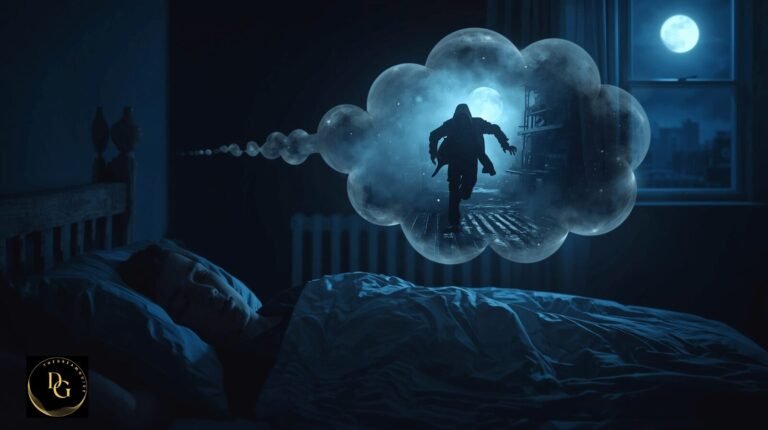What Do Snake Dreams Mean? Spiritual & Psychological Guide
Snake dreams are among the most common and emotionally vivid animal dreams. Many people wake up with strong feelings — fear, relief, curiosity, shame, or even awe.
Because snakes carry clear biological and cultural signals such as movement, stealth, danger, and shedding skin, they often represent powerful waking-life concerns. These dreams become containers for hidden emotions and unresolved conflicts.
To truly answer what do snake dreams mean, both psychology and spirituality need to be considered. In many traditions, snakes symbolize temptation, danger, and also transformation, offering a spiritual and psychological guide to personal growth.
Contents
- 1 Quick answer
- 2 Why snake dreams matter
- 3 How dreaming works (brief overview)
- 4 Step-by-step: how to interpret your snake dream (practical method)
- 5 Common dream scenarios and practical interpretations
- 6 Religious and cultural perspectives
- 7 Psychological and neuroscientific viewpoints
- 8 Simple evidence-based actions after a snake dream
- 9 When to seek professional help:
- 10 Combining spiritual and clinical approaches:
- 11 Journaling prompts for a week:
- 12 One-week plan to reduce disturbing snake dreams:
- 13 Safety note: Don’t make major life decisions based on a single dream.
- 14 FAQ:
- 15 References:
- 16 Closing advice:
Quick answer
Dreaming of snakes usually points to one or more of the following: change (shedding old habits), a hidden threat or worry, or strong body/sexual energy. The exact meaning depends on how you felt in the dream, what the snake did, and your cultural or spiritual background. If dreams are upsetting or repeat often, try imagery rehearsal therapy (rewrite the dream), improve sleep habits, or talk with a counselor or trusted spiritual mentor.

Why snake dreams matter
- Emotionally intense: Vivid snake dreams can change your mood, influence decisions, or make you worry about “what the dream means.”
- Symbolically rich: Across cultures, snakes represent transformation, danger, wisdom, healing, and sexuality. That makes them flexible symbols for the dreaming mind.
- Actionable signal: Recurrent or very disturbing snake dreams often point to unresolved psychological issues, ongoing stressors, or active spiritual processes. Recognizing this lets you take helpful steps instead of letting the dreams control you.
How dreaming works (brief overview)
Dreams occur during rapid eye movement (REM) sleep, a stage associated with vivid imagery and strong emotion. Neuroscience and sleep research suggest dreaming plays a role in processing emotions, consolidating memories, and simulating challenges so the brain can rehearse responses (Domhoff, 2018; Walker & van der Helm, 2009). Emotionally charged waking events are more likely to appear in dreams; that’s why intense experiences—conflict, grief, excitement, spiritual practice—often produce vivid dreams, including snake dreams.
Step-by-step: how to interpret your snake dream (practical method)
Step 1 — Capture the dream as soon as possible
Keep a bedside journal. Note setting, snake details (color, size, species if you noticed it), actions (slithered, watched, attacked, bit, shed skin), your role (victim, observer, in control), main emotion (fear, calm, shame, curiosity), and any waking sensations (rapid heartbeat, sweating). Research shows immediate recording preserves more detail and helps identify patterns over time (Schredl, 2010).
Step 2 — Ask three quick questions
- What emotion dominated the dream? (Affect is often the strongest clue.)
- What did the snake do? (Attack, shed, watch, bite, transform.)
- Where was the snake? (Bedroom, bathroom, workplace, outdoors.)
These anchors—emotion, action, and location—help you map the dream image to waking life.
Step 3 — Use Three Interpretive Lenses
Transformation / Rebirth:
Shedding skin, calm snakes, or snakes guiding you may indicate personal growth or recovery.
Threat / Deception:
Aggressive or hidden snakes often symbolize danger or betrayal. Fear or biting intensifies this meaning.
Sexual / Bodily Energy:
Snakes can represent sexual desire or bodily sensations. Use this lens if sexual context or feelings are present.
These lenses are tools; choose what fits your situation.
Common dream scenarios and practical interpretations
- Snake sheds skin while you watch: A positive sign of renewal or fresh start.
- You are bitten by a snake: Symbolizes an emotional wound or anxiety that “poisons” well-being. If infected in the dream, the issue may be worsening.
- You’re chased by a snake but wake before it catches you: Often means avoidance of a problem still affecting you.
- You hold a snake calmly: Suggests integration of a powerful impulse or resource like sexuality or intuition.
- A nest of many snakes: Feeling overwhelmed by multiple anxieties; may indicate social conflicts.
- Snake in your bed: Points to intimate or bodily matters such as sexuality or illness.
Religious and cultural perspectives
Christian / Biblical view
The serpent in Genesis 3 links snakes to deception and sin; Revelation identifies the serpent with Satan. However, the bronze serpent Moses raised in Numbers 21 symbolizes healing. Many Christians see disturbing snake dreams as calls to prayer and spiritual counsel.
Hindu / Kundalini view
Kundalini is depicted as a coiled serpent at the spine’s base; awakening causes psychic and physical changes. Vivid snake dreams during spiritual practice might reflect this energy movement. Guidance from experienced teachers is advised.
Indigenous and folk views
Many indigenous cultures regard snakes as spirit allies or tricksters with mixed meanings depending on local teachings.
Psychological and neuroscientific viewpoints
Dreams as emotional processing
REM sleep helps consolidate emotional memories (Walker & van der Helm, 2009). Snakes are common in anxiety dreams and nightmares (Domhoff; Schredl). People under stress or trauma report more snake dreams.
Nightmares trauma and phobias
People with phobias or trauma may have nightmares replaying threat imagery including snakes. Treatments include Imagery Rehearsal Therapy (IRT) and trauma-focused therapy (Krakow et al.; NIMH).
Simple evidence-based actions after a snake dream
Immediate steps:
- Journal the dream with emotional intensity rating.
- Ground yourself with slow breathing or a short walk.
- Maintain good sleep hygiene.
Imagery Rehearsal Therapy (IRT):
Rewrite your nightmare ending positively; visualize it daily for 10–15 minutes; rehearse before sleep. This reduces nightmare frequency within weeks (Krakow et al.).
Short-term coping:
breathing exercises, muscle relaxation, cognitive reframing (“dreams are symbolic”), limiting alcohol/stimulants near bedtime.
When to seek professional help:
If nightmares are frequent/severe or linked to trauma/panic/suicidal thoughts—consult a clinician for CBT, IRT, trauma therapy.

Combining spiritual and clinical approaches:
Use prayer/counsel alongside therapy as needed; involve both spiritual mentors and mental health professionals for balanced care.
Journaling prompts for a week:
- What feeling dominated? How does it relate to waking life?
- Where am I facing change or betrayal?
- Who triggers these feelings?
- Have I changed routines recently?
- What small action can I take this week?
One-week plan to reduce disturbing snake dreams:
Day 1–2: Start journaling; wind down before bed without screens.
Day 3–5: Practice IRT on recurring dreams; maintain sleep hygiene.
Day 6–7: Reflect on patterns; seek professional help if needed.
Safety note: Don’t make major life decisions based on a single dream.
Signs snake dreams may indicate spiritual awakening:
Dreams feel sacred/uplifting; you notice synchronicities; occur during spiritual practice—seek guidance from experienced teachers.
FAQ:
Q: Do snake dreams always mean something bad?
No, snake dreams don’t always have a negative meaning. The interpretation depends on the context of the dream. While some snake dreams may symbolize fear or hidden danger, others can represent transformation, healing, or personal growth.
Q: What does it mean if a snake bites me in a dream?
A snake bite in a dream often represents emotional wounds, betrayal, or unresolved pain in waking life. If these dreams are recurring, grounding practices, therapy, or stress management can help address the underlying issues.
Q: Why do I keep having recurring snake dreams?
Recurring snake dreams may indicate ongoing stress, trauma, or unresolved emotions. Research shows that methods like Image Rehearsal Therapy (IRT) and good sleep hygiene can help reduce these repetitive dreams over time.
Q: Do snakes in dreams have sexual symbolism?
Yes, in some cases, snakes in dreams can carry sexual symbolism. This interpretation depends on the dream’s context and your personal associations with snakes. It may point to intimacy, temptation, or suppressed desires.
Q: Should I interpret snake dreams spiritually or psychologically?
Both interpretations are valid. From a psychological perspective, snakes may reflect fears, stress, or transformation. Spiritually, they can symbolize rebirth, energy, or hidden wisdom. The best approach is to consider both aspects together.
References:
- Barrett, D. (2001). The Committee of Sleep: A Study of Dream Incubation.
Amazon link - Domhoff, G. W. (2018). The Scientific Study of Dreams: Neural, Cognitive, and Clinical Perspectives.
Read online for free - Jung, C. G. (Various works on symbolism and transformation).
Simply Psychology summary - Krakow, B., et al. (Clinical studies on Imagery Rehearsal Therapy for nightmares).
PubMed article - Nielsen, T., & Levin, R. (2007). Nightmares: A new neurocognitive model. Sleep Medicine Reviews.
ScienceDirect article - Walker, M. P., & van der Helm, E. (2009). Overnight therapy? Sleep and emotional brain processing. Nature Reviews Neuroscience.
Nature article - National Institute of Mental Health (NIMH). Sleep and Dreams overview.
https://www.nimh.nih.gov/health/topics/sleep-disorders/index.shtml - American Psychological Association (APA). Resources on nightmares and trauma.
https://www.apa.org/topics/trauma - Biblical passages:
- Genesis 3 — Bible Gateway
- Numbers 21:4–9 — Bible Gateway
- Matthew 10:16 — Bible Gateway
- Revelation 12 — Bible Gateway
- Feuerstein, G. (1990). The Yoga Tradition (for Kundalini background).
Publisher’s page
Closing advice:
Journal one-off dreams; try IRT and sleep hygiene for recurrent ones; combine spiritual reflection with grounding techniques as needed.







